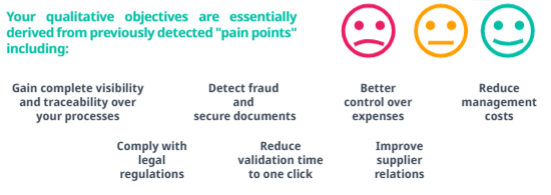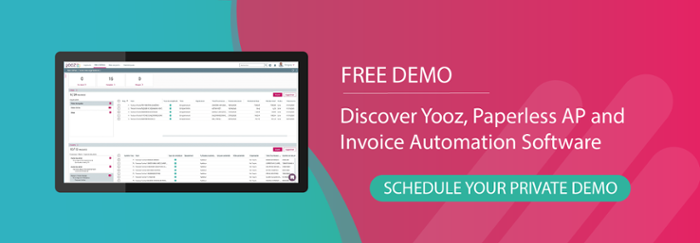As someone who works in finance, payroll and accounts payable fraud might not be at the top of your priority list right now. However, that’s usually because it only becomes a concern when it’s already too late. If you want to be proactive and protect the organization, you'll need to provide the accounts payable department and payroll team with the tools that stop and prevent fraud. Otherwise, it’s only a matter of time until something happens.
It’s a common myth that only large enterprises and publicly listed companies are a target of fraud. Although it makes sense that fraudsters will look to target those with the largest coffers, these employers typically have a dedicated IT and cybersecurity team along with automated technolgies that help protect them from even the most sophisticated of attacks. It’s often the smaller businesses (and even medium-sized ones) - the ones which think they would never be a target - who lack the security processes and technology to properly defend themselves.
But regardless of size, within businesses both large and small, the issue of accounts payable and payroll fraud continues to be under prioritized. Despite the continued digitalisation and intelligent technology adopted within finance departments, the ability to detect and prevent fraud from reaching AP and payroll has seen limited success.
What is payroll and accounts payable fraud?
Although the two roles are very different, accounts payable and payroll are linked in that they are the two biggest target areas for fraud. In general, every penny that a business spends falls under accounts payable, making it a critical aspect of any business. However, there are times when even payroll (staff salaries, bonuses, etc.) is paid through accounts payable – for example, when hiring contractors or freelancers – and is therefore just as susceptible to the same problems as accounts payable. And vice versa is also true; if accounts payable is hit by fraud, it could lead to issues with payroll.
As fraud can occur in a myriad of ways from both inside and outside of the company, and as payroll is calculated separately from accounts payable, these are two critical areas that need to be protected. When dealing with quantity and any endless stream of numbers, fraudsters can go undetected for a long time before a business might notice that something is amiss This is especially true when staff don't have the benefit of using intelligent or automated tools. How is someone from accounts payable or payroll supposed to know that a vendor or member of staff’s bank details have been changed to a shell account? Or that a business or service really doesn't exist? Or what if they miss a duplicate report or claim?
Fraudulent activity within businesses tends to come from those that don’t have visibility over who is accessing and downloading financial documents or control over who has access to certain information. But even then, all it takes is one duplicated or doctored invoice to fool the accounts payable and payroll department to process a payment. This is especially true in the case of those that don’t use platforms that can detect this for them, but more on that later.
Accounts payable and payroll fraud involves a person or group making fake documents to convince a business to pay them a certain sum of money. That might sound too simple to work, especially for firms that invest heavily in security, but even the biggest of corporations have been fooled. Tech giants Facebook and Google were only recently conned out of a total of $122 million US dollars by someone who successfully used imitation email addresses and fake invoices to make it look like they were a legitimate supplier. [1]
The issue of accounts payable and payroll fraud comes down to two things: visibility and control. Anyone with a laptop can create a fake invoice, but it’s being able to discover financial data, invoices, or even a list of vendors that makes it easier for fraudsters to trick the savviest of accounts payable staff into making a payment, especially if they’re still manually checking and validating processes.
The most common types of payroll and accounts payable fraud
Common types of accounts payable and payroll fraud include the faking of invoices, receipts and purchase orders, changing a company’s bank account information to their own, or intentionally over-billing on expense sheets. There have been more extreme examples of fraud over the years, such as employees who created their own company to make payments to or even creating fake employees to put on the payroll.
Another issue seen in larger organisations is that it can be easy to set up ‘ghost employees’. These are staff members that don’t exist other than as an entity on the payroll system which enables them to take money out of the company and into a shell account. Plus, thanks to the sheer size of the organization, a report by the Association of Certified Fraud Examiners state that payroll fraud schemes last for an average of 24 months.[2] Other examples of payroll fraud include purposely overstating the amount of time spent working if paid by the hour, or when inflating the true amount of sales made, which then affects how much commission is paid.
Although these types of fraud are frequent, by far one of the most common types of accounts payable fraud in recent years has been phishing scams. Rather than target specific systems, phishing schemes focus on people and come when outside parties pretend that they are someone they’re not (such as the company CEO, a vendor, or a bank) to convince staff within the accounts payable team to process a payment. More sophisticated phishing attacks can come in the form of sending invoices which, when opened, give the attacker access to folder passwords or the accounts payable system, and they can be incredibly costly. Email-based phishing accounts for the most popular and successful form of attack, with the average cost for UK companies estimated at over £3 million. Unfortunately, phishing scams are only expected to increase in the future as they continue to successfully trick staff into processing payments.
Automated payroll and accounts payable fraud detection
While automating your accounts payable process is an idea solution, if you're looking at outsourcing as an option, be wary. Providers that don’t supply complete automation in-house actually increases the opportunity and risk of fraud occurring. This is because instead of using automated technology themselves, many outsourced providers skip the costs and send data out to other third parties to be manually processed. Not only does this increase the time taken to process information, but it also means more people have access to it; people that you don’t have visibility or control over and possibly haven't even been vetted for security.
End-to-end automation in the accounts payable and payroll process helps detect fraudulent processes from either outside or within the business as well as prevents payments from being sent. It does this by utilising different technologies such as Big Data, machine learning, and artificial intelligence to record, scan, and validate information from certain sources against others. For example, if an invoice is received by email, the automated accounts payable system would realise it is a fake by checking it against the relevant Purchase Order (PO) or receipt information, bank account details, or even the total cost owed and flag it as a potential scam. Human intervention only comes in when double-checking the person or group is not who they pretend to be.
With accounts payable and payroll automation, it's even possible to restrict visibility and access of financial information and the accounts payable system to a strict number of people such as financial decision-makers, line managers, or certain departments and not others. This is especially important when it comes to home, remote, or hybrid workforces. As finance managers no longer have the instant visibility over people and tasks that they once did when every employee was in the office, they need to ensure that only trusted members of the team have access to sensitive and highly confidential information.

Preventing payroll and accounts payable fraud
The good news? Just as accounts payable and payroll fraud is not restricted by business size, neither is technology. Automation is no longer a luxury that can only be afforded by large enterprises. Rather, all kinds and sizes of business can enjoy the benefits of automated accounts payable and payroll. This is true when it comes to preventing fraud, but also in terms of time, cost, and resource savings that comes from eliminating routine manual processes.
Using automated accounts payable and payroll systems, businesses can make sure that their finances are safe, with a system that removes the risk associated with manual processes. Humans aren’t perfect, but with the help of automated tools we can help make sure fraud in the accounts payable and payroll department never takes place.
Click to discover how accounts payable automation can help prevent fraud.








